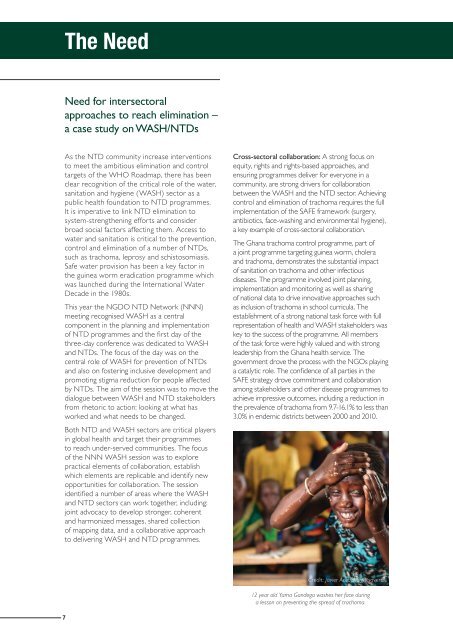1jeGTyf
1jeGTyf
1jeGTyf
You also want an ePaper? Increase the reach of your titles
YUMPU automatically turns print PDFs into web optimized ePapers that Google loves.
The Need<br />
Need for intersectoral<br />
approaches to reach elimination –<br />
a case study on WASH/NTDs<br />
As the NTD community increase interventions<br />
to meet the ambitious elimination and control<br />
targets of the WHO Roadmap, there has been<br />
clear recognition of the critical role of the water,<br />
sanitation and hygiene (WASH) sector as a<br />
public health foundation to NTD programmes.<br />
It is imperative to link NTD elimination to<br />
system-strengthening efforts and consider<br />
broad social factors affecting them. Access to<br />
water and sanitation is critical to the prevention,<br />
control and elimination of a number of NTDs,<br />
such as trachoma, leprosy and schistosomiasis.<br />
Safe water provision has been a key factor in<br />
the guinea worm eradication programme which<br />
was launched during the International Water<br />
Decade in the 1980s.<br />
This year the NGDO NTD Network (NNN)<br />
meeting recognised WASH as a central<br />
component in the planning and implementation<br />
of NTD programmes and the first day of the<br />
three-day conference was dedicated to WASH<br />
and NTDs. The focus of the day was on the<br />
central role of WASH for prevention of NTDs<br />
and also on fostering inclusive development and<br />
promoting stigma reduction for people affected<br />
by NTDs. The aim of the session was to move the<br />
dialogue between WASH and NTD stakeholders<br />
from rhetoric to action: looking at what has<br />
worked and what needs to be changed.<br />
Both NTD and WASH sectors are critical players<br />
in global health and target their programmes<br />
to reach under-served communities. The focus<br />
of the NNN WASH session was to explore<br />
practical elements of collaboration, establish<br />
which elements are replicable and identify new<br />
opportunities for collaboration. The session<br />
identified a number of areas where the WASH<br />
and NTD sectors can work together, including:<br />
joint advocacy to develop stronger, coherent<br />
and harmonized messages, shared collection<br />
of mapping data, and a collaborative approach<br />
to delivering WASH and NTD programmes.<br />
Cross-sectoral collaboration: A strong focus on<br />
equity, rights and rights-based approaches, and<br />
ensuring programmes deliver for everyone in a<br />
community, are strong drivers for collaboration<br />
between the WASH and the NTD sector. Achieving<br />
control and elimination of trachoma requires the full<br />
implementation of the SAFE framework (surgery,<br />
antibiotics, face-washing and environmental hygiene),<br />
a key example of cross-sectoral collaboration.<br />
The Ghana trachoma control programme, part of<br />
a joint programme targeting guinea worm, cholera<br />
and trachoma, demonstrates the substantial impact<br />
of sanitation on trachoma and other infectious<br />
diseases. The programme involved joint planning,<br />
implementation and monitoring as well as sharing<br />
of national data to drive innovative approaches such<br />
as inclusion of trachoma in school curricula. The<br />
establishment of a strong national task force with full<br />
representation of health and WASH stakeholders was<br />
key to the success of the programme. All members<br />
of the task force were highly valued and with strong<br />
leadership from the Ghana health service. The<br />
government drove the process with the NGOs playing<br />
a catalytic role. The confidence of all parties in the<br />
SAFE strategy drove commitment and collaboration<br />
among stakeholders and other disease programmes to<br />
achieve impressive outcomes, including a reduction in<br />
the prevalence of trachoma from 9.7-16.1% to less than<br />
3.0% in endemic districts between 2000 and 2010.<br />
Credit: Javier Acebal/Sightsavers.<br />
12 year old Yama Gandega washes her face during<br />
a lesson on preventing the spread of trachoma.<br />
7


